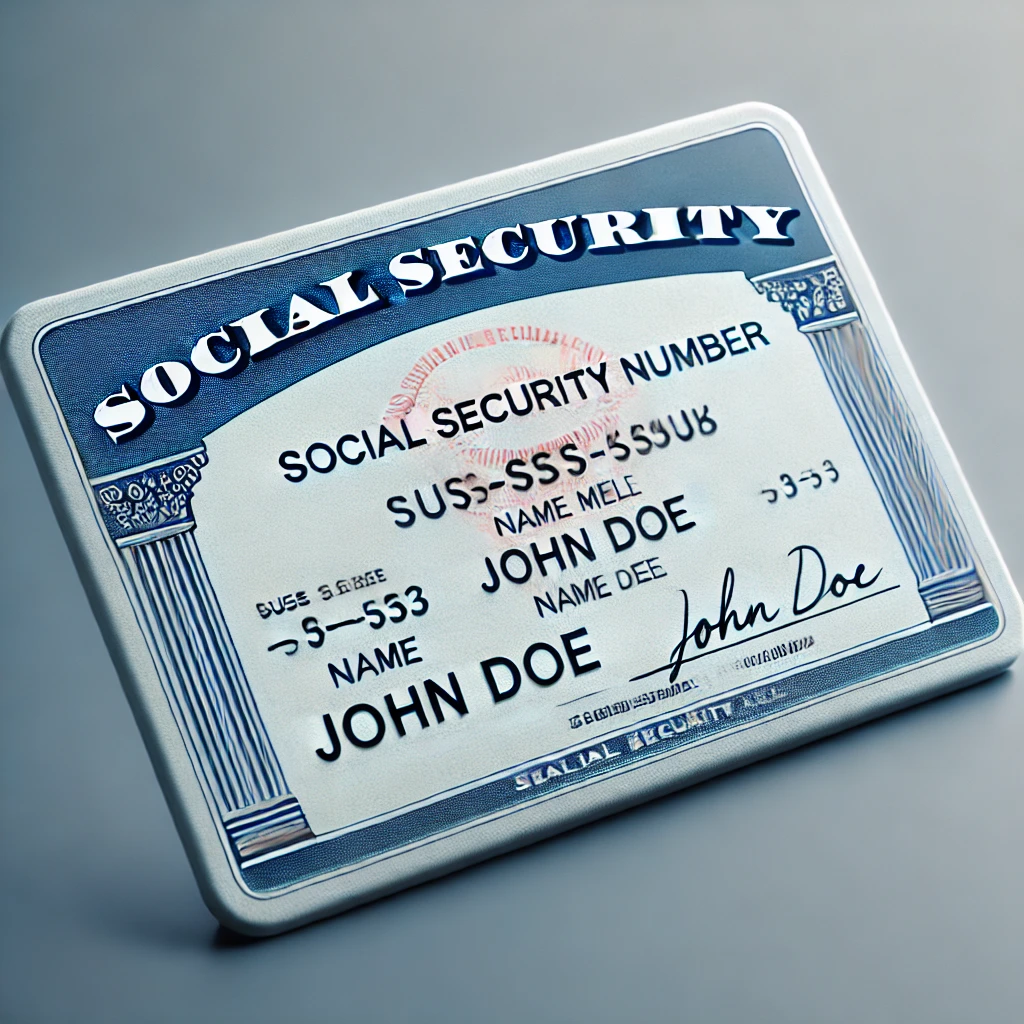An SSN for work is not just a number—it’s the key to legal employment, tax reporting, and accessing government benefits in the United States. Whether you’re an international worker, a new immigrant, or a U.S. citizen, understanding if you need a Social Security Number (SSN) and how to obtain one is critical. In this comprehensive guide, we break down the most common questions, challenges, and practical tips about SSNs for work in the U.S., helping you navigate the process with confidence.

Table of Contents
Introduction
The Social Security Number (SSN) is a unique nine-digit identifier issued by the Social Security Administration (SSA). Originally designed to track earnings and calculate Social Security benefits, the SSN has evolved into a de facto national identification number used by employers, government agencies, and financial institutions. In the context of employment, your SSN is essential for verifying your work eligibility, reporting your wages to the Internal Revenue Service (IRS), and ensuring proper tax withholdings.
For international audiences from the US, UK, Canada, Australia, New Zealand, India, UAE, Mexico, and beyond, this guide explains:
- What an SSN is and why it’s important for employment.
- Common hurdles and pain points when applying for or using an SSN.
- A step-by-step guide to applying for your SSN.
- Tips, key factors, and frequently asked questions (FAQs).
Frequently Asked Questions
What Is an SSN and Why Do You Need It for Work?
- Definition: A Social Security Number is a unique nine-digit number (format: XXX-XX-XXXX) issued by the SSA.
- Purpose: It’s used to track your earnings, report wages to the government, and determine eligibility for Social Security benefits.
- Employment Requirement: Most employers require an SSN to verify your legal eligibility to work, as mandated by the IRS and other federal regulations.
Who Needs an SSN?
- U.S. Citizens and Permanent Residents: Automatically eligible for an SSN.
- Noncitizens with Work Authorization: Those on visas (such as H-1B, F-1 with CPT/OPT, J-1) who are legally permitted to work.
- Individuals Requiring Tax Reporting: Even if you’re not employed, an SSN may be needed for filing taxes or receiving certain government services.
How Does the SSN Impact Employment?
- Employment Verification: Employers use the SSN for Form I-9 to verify identity and work authorization.
- Tax Reporting: The SSN is essential for accurate wage reporting and processing tax returns.
- Access to Benefits: It is required for collecting Social Security benefits, applying for loans, and other financial services.
Hurdles and Pain Points
Processing Delays and Verification Issues
- Delays in Issuance: Noncitizens, in particular, might experience delays when applying for an SSN. The SSA recommends waiting at least 10 days after arriving in the U.S. to ensure DHS records are updated.
- Document Verification: Ensuring that all documents (such as passports, visas, and employment authorization documents) are correct and unexpired is crucial. Missing or mismatched documentation can lead to delays or denials.
Employer Requirements and Misunderstandings
- Employer Confusion: Some employers may not fully understand that you can begin working while your SSN application is pending if you have proof of application. This can lead to unnecessary delays in starting work.
- Tax Filing Complications: Without an SSN, filing your taxes correctly becomes challenging. In such cases, some may consider applying for an Individual Taxpayer Identification Number (ITIN) instead—but note that an ITIN does not grant work authorization.
Complexity for International Students and Temporary Workers
- Visa-Specific Requirements: Different visa categories have distinct rules regarding SSN eligibility. For example, F-1 and J-1 students must show evidence of employment authorization (e.g., on-campus job offer, CPT, OPT, or DS-2019 sponsorship) before they can apply.
- Lack of Clarity: International applicants often find the SSN application process confusing due to differing document requirements and processing timelines.
Step-by-Step Guide to Obtaining an SSN
For U.S. Citizens and Permanent Residents
- Gather Necessary Documents:
- Proof of U.S. citizenship (e.g., U.S. passport or birth certificate) or lawful permanent residency (Green Card).
- A completed Form SS-5 (Application for a Social Security Card).
- Visit a Local SSA Office:
- Find your nearest office via the SSA Office Locator.
- Submit Your Application:
- Provide your original or certified documents. Photocopies or notarized copies are not accepted.
- Receive Your SSN Card:
- After processing, your SSN card will be mailed to you—usually within 10–14 business days.
For Noncitizens with Work Authorization
- Determine Eligibility:
- Confirm your visa type (H-1B, F-1 with work authorization, J-1, etc.) allows you to work.
- Collect Supporting Documents:
- Passport (unexpired).
- Visa and I-94 record.
- Employment Authorization Document (EAD) if applicable.
- Proof of work authorization (e.g., on-campus job offer letter for F-1 students).
- Complete Form SS-5:
- Fill out the SS-5 form with accurate personal and immigration details.
- Submit Your Application at an SSA Office:
- Bring your documents in person to a local SSA office.
- Wait for Your SSN Card:
- Processing times vary; if approved, you will receive your card within a few weeks.
Special Considerations for International Students
- Employment Proof: F-1 and J-1 students must secure employment (on-campus or via CPT/OPT) and obtain a letter from their school or sponsor.
- Timing Your Application: Apply no more than 30 days before your job start date to avoid early rejections.
- DSO/OSIS Assistance: Use your Designated School Official (DSO) or Office of International Students and Scholars for guidance.
Tips & Tricks for a Smooth SSN Application Process
- Apply Early but Not Too Early: Wait at least 10 days after arriving in the U.S. to ensure all records are updated.
- Keep Originals Handy: Always carry original documents or certified copies. Do not rely on photocopies.
- Use Proof of Application: If your SSN is pending, request a receipt from the SSA to show your employer that you have applied.
- Double-Check Documentation: Ensure that all names, dates, and document numbers are consistent across your passport, visa, and employment authorization documents.
- Maintain Communication with Your Employer: Inform your employer about the application process and expected timelines to avoid confusion during onboarding.
- Stay Updated: Check the SSA website for any updates or changes in application procedures.
Key Factors to Consider
- Legal Work Authorization: Your ability to work in the U.S. is directly tied to your immigration status. Ensure that you have the proper visa or work permit before applying for an SSN.
- Employer Requirements: Most employers require an SSN for payroll processing and tax reporting. If you’re waiting for your SSN, provide alternative proof of application.
- Tax Implications: The SSN is critical for tax reporting purposes. Without it, you may have to use an ITIN, which does not confer work authorization.
- Processing Time: SSN issuance can take several weeks. Factor this into your employment start date planning.
- Document Accuracy: Inaccurate or expired documents are a common hurdle. Verify all information before submission.
- State-Specific Regulations: Some states have additional requirements for identification and employment verification. Check local guidelines if needed.
Frequently Asked Questions (FAQs)
- Can I Start Working Before Receiving My SSN?
Yes, you can begin working if you have applied for an SSN and can provide proof of application. However, your employer must eventually update your records once you receive the card. - What If My SSN Application Is Delayed?
Inform your employer about the delay and provide them with the receipt from the SSA. You may also consider consulting with an immigration expert if the delay exceeds the typical processing time. - Do International Students Need an SSN?
Only if you are authorized to work (on-campus or off-campus under CPT/OPT). Otherwise, you may need an ITIN for tax purposes. - What Documents Do I Need to Provide?
Typically, you need your passport, visa, I-94 record, and if applicable, your Employment Authorization Document (EAD) or a letter from your employer/school. - Is There a Fee for Applying for an SSN?
No, applying for an SSN is free of charge. - Can I Use an ITIN Instead of an SSN for Work?
No, an ITIN is strictly for tax filing and does not confer legal work authorization. You must have a valid SSN to work.
Related Topics You May Also Be Interested;
- Green Card vs. U.S. Citizenship: Key Differences You Should Know
Learn how your immigration status affects employment eligibility and access to government benefits.
Read more on doclassified.com - Impact of Changing Immigration Laws on Visa Policies in 2025
Understand how evolving immigration policies can impact work visas and employment rights in the U.S.
Discover more on amglobal.org - SSN vs. ITIN: Which One Do You Need?
A detailed comparison of SSNs and ITINs, focusing on eligibility, use, and application processes.
Need Assistance?
Navigating the SSN application process can be complex, especially for noncitizens and international students. If you need professional assistance with your SSN application or immigration-related queries, contact our expert team today. Our seasoned professionals are ready to guide you every step of the way and ensure that you meet all legal requirements for working in the U.S.
Conclusion
An SSN is essential for working in the U.S., impacting everything from employment verification and tax reporting to accessing government benefits. By understanding the application process, gathering the correct documentation, and staying informed about potential hurdles, you can ensure a smooth transition into the U.S. workforce. Whether you’re a U.S. citizen, permanent resident, or international worker, the right preparation and expert guidance can make all the difference.
Disclaimer
The information provided in this article is for general informational purposes only and does not constitute legal or professional advice. Always consult with a qualified immigration or tax professional regarding your individual circumstances.
Affiliate Disclosure
Some links included in this article are affiliate links, meaning we may earn a commission if you make a purchase through them. This comes at no extra cost to you and helps support our work.






